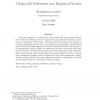Free Online Productivity Tools
i2Speak
i2Symbol
i2OCR
iTex2Img
iWeb2Print
iWeb2Shot
i2Type
iPdf2Split
iPdf2Merge
i2Bopomofo
i2Arabic
i2Style
i2Image
i2PDF
iLatex2Rtf
Sci2ools
105
click to vote
MSS
2008
IEEE
2008
IEEE
Voting with preferences over margins of victory
This paper analyzes a two-alternative voting model with the distinctive feature that voters have preferences over the support that each alternative receives, and not only over the identity of the winner. The main result of the paper is the existence of a unique equilibrium outcome with a very intuitive characterization: in equilibrium voters who prefer a higher support for one of the alternatives vote for such alternative. Its computation is equally simple: the equilibrium outcome is the unique fixed point of the connected survival function associated to the distribution of the electorate. This characterization works for electorates with a finite number of citizens as well as with a continuum of agents, and for scenarios with and without abstention. Finally, strategic voting (voting for the least preferred alternative) is common for a fraction of the electorate who favor electorally "balanced" results.
Equilibrium Outcome | Hardware | MSS 2008 | Two-alternative Voting Model | Unique Equilibrium Outcome |
| Added | 13 Dec 2010 |
| Updated | 13 Dec 2010 |
| Type | Journal |
| Year | 2008 |
| Where | MSS |
| Authors | Humberto Llavador |
Comments (0)

